- CLASSIC MAGAZINES
- REVIEW CREW
A show recapping what critics thought back
when classic games first came out! - NEXT GENERATION'S BEST & WORST
From the worst 1-star reviews to the best
5-stars can offer, this is Next Generation! - NINTENDO POWER (ARCHIVE)
Experience a variety of shows looking at the
often baffling history of Nintendo Power! - MAGAZINE RETROSPECTIVE
We're looking at the absolutely true history of
some of the most iconic game magazines ever! - SUPER PLAY'S TOP 600
The longest and most ambitious Super NES
countdown on the internet! - THEY SAID WHAT?
Debunking predictions and gossip found
in classic video game magazines! - NEXT GENERATION UNCOVERED
Cyril is back in this spin-off series, featuring the
cover critic review the art of Next Generation! - HARDCORE GAMER MAGAZING (PDF ISSUES)
Download all 36 issues of Hardcore Gamer
Magazine and relive the fun in PDF form!
- REVIEW CREW
- ELECTRONIC GAMING MONTHLY
- ELECTRONIC GAMING MONTHLY RANKS
From Mario to Sonic to Street Fighter, EGM
ranks classic game franchises and consoles! - ELECTRONIC GAMING MONTHLY BEST & WORST
Counting down EGM’s best and worst reviews
going year by year, from 1989 – 2009! - ELECTRONIC GAMING BEST & WORST AWARDS
11-part video series chronicling the ups and
downs of EGM’s Best & Worst Awards!
- ELECTRONIC GAMING MONTHLY RANKS
- GAME HISTORY
- GAME OVER: STORY BREAKDOWNS
Long-running series breaking down game
stories and analyzing their endings! - A BRIEF HISTORY OF GAMING w/ [NAME HERE]
Real history presented in a fun and pithy
format from a variety of game historians! - THE BLACK SHEEP
A series looking back at the black sheep
entries in popular game franchises! - INSTANT EXPERT
Everything you could possibly want to know
about a wide variety of gaming topics! - FREEZE FRAME
When something familiar happens in the games
industry, we're there to take a picture! - I'VE GOT YOUR NUMBER
Learn real video game history through a series
of number-themed episodes, starting at zero! - GREAT MOMENTS IN BAD ACTING
A joyous celebration of some of gaming's
absolute worst voice acting!
- GAME OVER: STORY BREAKDOWNS
- POPULAR SHOWS
- DG NEWS w/ LORNE RISELEY
Newsman Lorne Riseley hosts a regular
series looking at the hottest gaming news! - REVIEW REWIND
Cyril replays a game he reviewed 10+ years
ago to see if he got it right or wrong! - ON-RUNNING FEUDS
Defunct Games' longest-running show, with
editorials, observations and other fun oddities! - DEFUNCT GAMES QUIZ (ARCHIVE)
From online quizzes to game shows, we're
putting your video game knowledge to the test!- QUIZ: ONLINE PASS
Take a weekly quiz to see how well you know
the news and current gaming events! - QUIZ: KNOW THE GAME
One-on-one quiz show where contestants
find out if they actually know classic games! - QUIZ: THE LEADERBOARD
Can you guess the game based on the classic
review? Find out with The Leaderboard!
- QUIZ: ONLINE PASS
- DEFUNCT GAMES VS.
Cyril and the Defunct Games staff isn't afraid
to choose their favorite games and more! - CYRIL READS WORLDS OF POWER
Defunct Games recreates classic game
novelizations through the audio book format!
- DG NEWS w/ LORNE RISELEY
- COMEDY
- GAME EXPECTANCY
How long will your favorite hero live? We crunch
the numbers in this series about dying! - VIDEO GAME ADVICE
Famous game characters answer real personal
advice questions with a humorous slant! - FAKE GAMES: GUERILLA SCRAPBOOK
A long-running series about fake games and
the people who love them (covers included)! - WORST GAME EVER
A contest that attempts to create the worst
video game ever made, complete with covers! - LEVEL 1 STORIES
Literature based on the first stages of some
of your favorite classic video games! - THE COVER CRITIC
One of Defunct Games' earliest shows, Cover
Critic digs up some of the worst box art ever! - COMMERCIAL BREAK
Take a trip through some of the best and
worst video game advertisements of all time! - COMIC BOOK MODS
You've never seen comics like this before.
A curious mix of rewritten video game comics!
- GAME EXPECTANCY
- SERIES ARCHIVE
- NINTENDO SWITCH ONLINE ARCHIVE
A regularly-updated list of every Nintendo
Switch Online release, plus links to review! - PLAYSTATION PLUS CLASSIC ARCHIVE
A comprehensive list of every PlayStation
Plus classic release, including links! - RETRO-BIT PUBLISHING ARCHIVE
A regularly-updated list of every Retro-Bit
game released! - REVIEW MARATHONS w/ ADAM WALLACE
Join critic Adam Wallace as he takes us on a
classic review marathon with different themes!- DEFUNCT GAMES GOLF CLUB
Adam Wallace takes to the links to slice his way
through 72 classic golf game reviews! - 007 IN PIXELS
Adam Wallace takes on the world's greatest spy
as he reviews 15 weeks of James Bond games! - A SALUTE TO VAMPIRES
Adam Wallace is sinking his teeth into a series
covering Castlevania, BloodRayne and more! - CAPCOM'S CURSE
Adam Wallace is celebrating 13 days of Halloween
with a line-up of Capcom's scariest games! - THE FALL OF SUPERMAN
Adam Wallace is a man of steel for playing
some of the absolute worst Superman games! - THE 31 GAMES OF HALLOWEEN
Adam Wallace spends every day of October afraid
as he reviews some of the scariest games ever! - 12 WEEKS OF STAR TREK
Adam Wallace boldly goes where no critic has
gone before in this Star Trek marathon!
- DEFUNCT GAMES GOLF CLUB
- DAYS OF CHRISTMAS (ARCHIVE)
Annual holiday series with themed-episodes
that date all the way back to 2001!- 2015: 30 Ridiculous Retro Rumors
- 2014: 29 Magazines of Christmas
- 2013: 29 Questionable Power-Ups of Christmas
- 2012: 34 Theme Songs of Christmas
- 2011: 32 Game Endings of Christmas
- 2010: 31 Bonus Levels of Christmas
- 2009: 30 Genres of Christmas
- 2008: 29 Controls of Christmas
- 2007: 34 Cliches of Christmas
- 2006: 33 Consoles of Christmas
- 2005: 32 Articles of Christmas
- 2004: 31 Websites of Christmas
- 2003: 29 Issues of Christmas
- 2002: 28 Years of Christmas
- 2001: 33 Days of Christmas
- NINTENDO SWITCH ONLINE ARCHIVE
- REVIEW ARCHIVE
- FULL ARCHIVE
Dead or Alive 5
With the skimpy clothing and annoying characters, I wouldn't blame you for wanting to dismiss Dead or Alive. This is a series that looks like it's specifically designed to appeal to teenage boys and nothing else. And yet, after five iterations, I'm constantly impressed with how much I enjoy the core fundamentals of Dead or Alive. Sure it's full of busty beauties brawling in skimpy clothing, but it's also one of the most accessible fighting games currently available on any platform. As goofy as it is, this is one series that shouldn't be dismissed.
This fourth sequel keeps things simple, refusing to radically change the core mechanics or add too many new characters. In fact, all of the characters you've grown to know and love return for another go at the DOA tournament. We get Bayman the soldier, Bass the motorcycle-riding pro wrestler, stoic Hayate, a very drunk Brad Wong and, of course, Ninja Gaiden's own Ryu Hayabusa. But wait, you can't forget the women that ultimately dominate this roster. We're given fan favorites like Kasumi, Helena, Tina, Christie, Ayane, Leifang and Hitomi, all with plenty of outfits to try on.
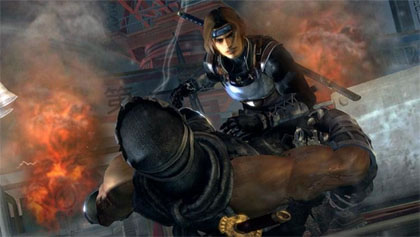
New to the roster are Mila (a spunky young MMA fighter) and Rig (a dark man who wears a hoodie). Sadly, neither of these characters are as colorful as Zack or Kasumi. Rig's bad temper left me cold and I could only handle so much of Mila's chirpiness. Also new to Dead or Alive are Akira Yuki, Sarah Bryant, and Pai Chan, all from Sega's Virtua Fighter series. This addition isn't ad jarring as you might think and help round out the game familiar faces.
In crafting Dead or Alive 5, Tecmo decided to take a page from last year's wildly successful Mortal Kombat reboot and include a lengthy story mode. In short, the plot revolves around Helena trying to rebuild the shattered DOATEC by funding (surprise!) a brand new fighting tournament. Oh, and she might be building an army full of cloned super fighters to help her take over the world.
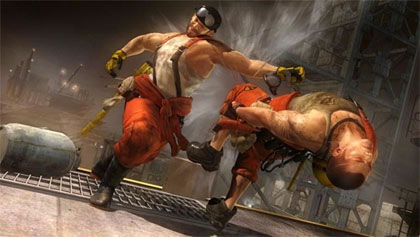
I imagine that at some point the game's plot was written out just like that. However, somewhere between creating the story and fitting it into the game, the script shattered into a million little pieces when it was accidentally dropped on the floor. Unfortunately, nobody at Tecmo could figure out how to put it back together, leaving us with a scatterbrained narrative that makes no sense. Dead or Alive 5 suffers from a severe case of ADHD.
We're fed pieces of the story a little at a time, cutting between characters and events in the most jarring way possible. Characters will seemingly teleport from country to country for no reason. Early on, Ayane travels from the United States to China to Antarctica without a single word of explanation (or wardrobe change). Even when the game eventually wraps back around to show the same events from a different point of view, it doesn't explain how everybody is able to travel great distances without concerns about money.
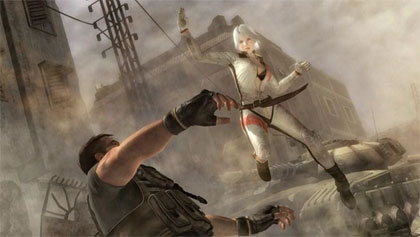
Also confusing is the tone of the story. At times it's deadly serious and full of personal drama. And yet, other times, it's so laughably goofy that I almost expect Porky Pig to jump out and do his best to say "That's all, folks!" This is a soap opera full of good looking people with devious plots. Unlike One Life to Live or General Hospital, here the characters don't have mad passionate sex. Instead they fight.
The reasons why characters fight is comical at best. Half the time it's for something so petty that it wouldn't even provoke an argument, let alone fisticuffs. Granted, a bit of that is to be expected in this kind of story, but it's hard to take any of Dead or Alive's story seriously until it's too late. The real tragedy is that the schizophrenic editing actually undermines what should have been an emotional ending. It all just left me scratching my head in utter bafflement.
On top of the convoluted story line, the single-player campaign acts as a training tool for teaching new players the basics. Each stage offers a bonus task for the player to complete. Here you'll learn about performing holds, pulling off charge attacks and throws. Eventually you'll be asked to juggle ten hit combos and use the background to inflict even more damage. Thankfully you won't have to complete these goals in order to progress through the story.
With only one punch and kick button, Dead or Alive is one of the most accessible fighting games on the market. It's easy to pull off really impressive moves by doing nothing more than button mashing. But don't think you can take the lazy way out, because any experienced player will be able to disarm the button masher in short order. The mechanics are deep, yet fluid and easy to control.
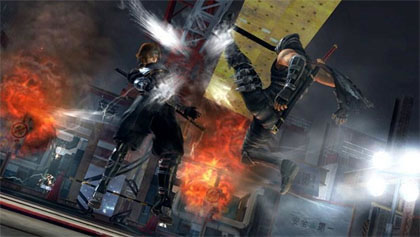
This time around Tecmo has tweaked the reversal system. Here we're given a hold button, which is the first step to turning a series of devastating attacks around on your opponent. The idea is to judge what kind of attack is coming and then hit the hold button and the appropriate direction. This takes a little getting used to, but is easy once you know what you're looking for. However, it's not so easy that you can exploit it through the entire round. Finally the Dead or Alive reversal feels balanced.
What has always set Dead or Alive apart from the other fighting games is the way the various stages will change and expand. Most of the backgrounds are interactive in ways you might not even expect. You are often able to hit the enemy over railings and through walls. One stage has the floor under your feet twisting and turning as the background explodes around you. Even when you can't knock somebody through a window or down a set of stairs, there's a lot of detail in the background to keep things interesting. With so much to interact with, the average Dead or Alive fight is captivating ... even if you're not the person playing.
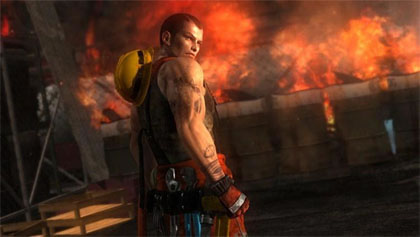
Beyond the lengthy story mode, solo players will have a chance to try their luck at any number of generic fighting game modes. Up first is the arcade mode, where you fight a few characters and the credits roll. There's also a time attack mode, which wants to know how quickly you can beat DOA5's story. Survival mode pits you up against a long line of bad guys and the training mode is there to let test out lengthy combos and special moves.
Dead or Alive 5 also offers the standard selection of multiplayer modes. I found the online rounds were smooth and it was always easy to locate a challenger. Regardless of whether you're playing online or off, there's an option for both one-on-one and tag team matches. Throw in a solid collection of characters (each with an impressive amount of outfit choices) and you have one of the best fighting games of the year.
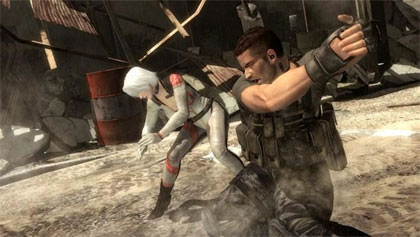
Dead or Alive 5 is also one of the best looking fighting games of the year. The character models really shine, even if they're not going out of their way to impressive. None of the outfits feel overdesigned, as is the case with so many recent fighters (I'm looking at you Konami). Tecmo keeps it simple, allowing for the incredible backgrounds and stunning animation to do the work. Just one caveat: Team Ninja continues to design certain body parts as if they were filled with helium. Even if it doesn't offend me, I still find it distracting.
While I wouldn't call Dead or Alive 5's story good, it is always entertaining (and baffling). Thankfully the rest of the game is even stronger, full of tight fighting mechanics that are easy to pick up and learn. It's also full of colorful backgrounds and memorable characters. In a year full of strong fighting games, Dead or Alive 5 should not be dismissed.
HOME |
CONTACT |
NOW HIRING |
WHAT IS DEFUNCT GAMES? |
NINTENDO SWITCH ONLINE |
RETRO-BIT PUBLISHING
Retro-Bit |
Switch Planet |
The Halcyon Show |
Same Name, Different Game |
Dragnix |
Press the Buttons
Game Zone Online | Hardcore Gamer | The Dreamcast Junkyard | Video Game Blogger
Dr Strife | Games For Lunch | Mondo Cool Cast | Boxed Pixels | Sega CD Universe | Gaming Trend
Game Zone Online | Hardcore Gamer | The Dreamcast Junkyard | Video Game Blogger
Dr Strife | Games For Lunch | Mondo Cool Cast | Boxed Pixels | Sega CD Universe | Gaming Trend
Copyright © 2001-2025 Defunct Games
All rights reserved. All trademarks are properties of their respective owners.
All rights reserved. All trademarks are properties of their respective owners.





























